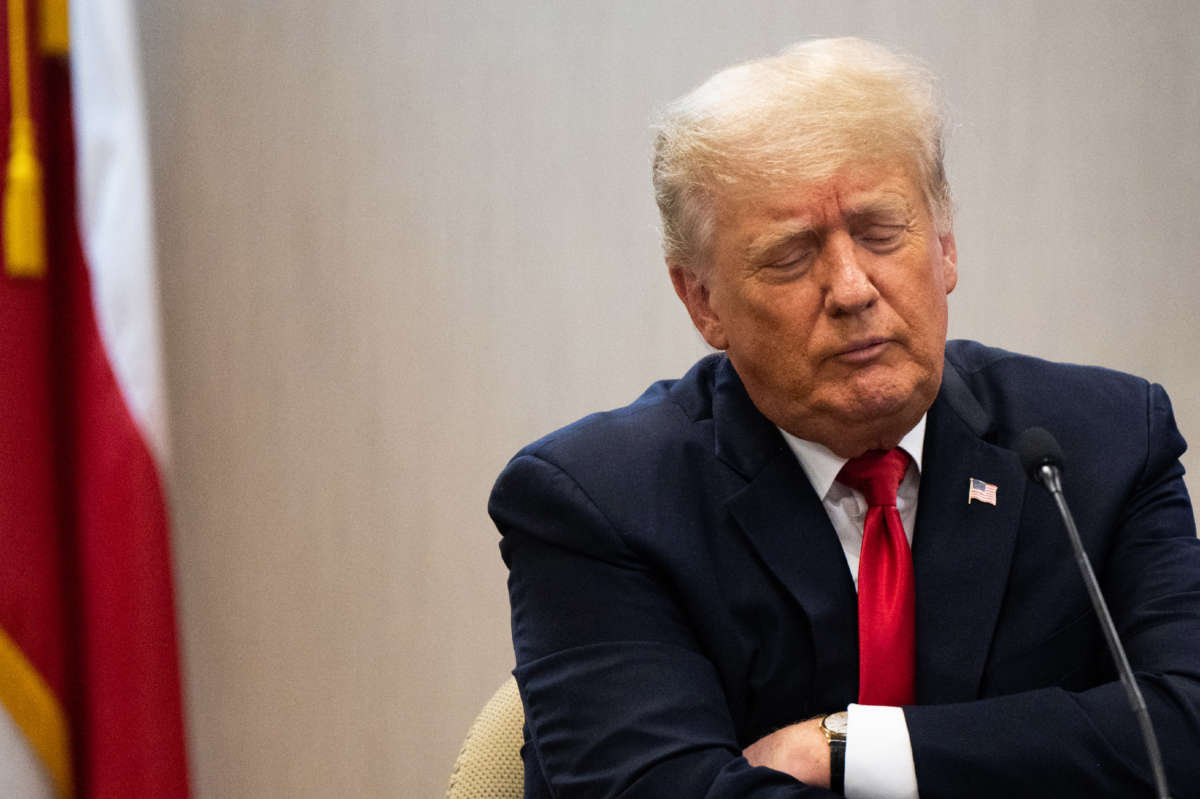Truthout is a vital news source and a living history of political struggle. If you think our work is valuable, support us with a donation of any size.
In a newly released survey of historians who study U.S. presidents and their tenure in office, former President Donald Trump received less-than-stellar marks, ranking low overall and dead last on the issue of “Moral Authority.”
C-SPAN’s Presidential Historians Survey is conducted every four years, and is released following a presidential election. First started in 2000, this year’s survey featured the opinions of 142 historians, professors, and other observers of the United States presidency.
Each member of the survey gives a score to every president in a number of categories on a scale from 1 to 10, with 10 meaning an individual is the “most effective” they can be on an issue. Results are then totaled together and averaged to create the rankings.
Notably, the survey is not a scientific one, as its managers are quick to admit, since it’s based on the opinions of its participants, who also have changed over the years. Trump’s recent departure as president is also fresh on the minds of those taking part, so there can be some bias there.
But it was still important to include Trump in the survey, the project’s coordinator Rachel Katz explained.
“We understand that it takes time once a president has left office to get a full assessment of the presidency, but we do conduct the survey soon after an administration so that we have a benchmark, so that we have a window into what the historians are thinking soon after an administration ends,” Katz said.
Trump received a total score in the survey of 312 points, putting him at fourth-lowest overall, just barely ahead of Franklin Pierce. His highest scores in individual categories were not particularly high, either — Trump placed 32nd in the category for Public Persuasion and 34th in Economic Management.
Conversely, Trump’s two immediate predecessors fared much better in the rankings. Barack Obama scored 664 points overall, giving him 10th place in the survey of presidents, while George W. Bush received 495 points, putting him in 29th place.
On the issue of Moral Authority, Trump received a dismal score of 18.7 points, which put him in last place within that category. For comparison, Obama received a score that was more than four times higher than that at 75.5 points, ranking him sixth in the category. The top three presidents in that category were Abraham Lincoln, George Washington and Franklin Roosevelt.
There are many reasons why Trump may have done poorly in the survey overall, and markedly bad in the Moral Authority category. He was the only president to be impeached twice while in office, the second time for inciting a mob of his loyalists to attack the U.S. Capitol building after his electoral defeat. Trump also had what’s been characterized as a “transactional” attitude on foreign policy, and promoted authoritarian leaders around the world who fed his ego.
And while many presidents in the past have expressed racist ideas, Trump didn’t try too hard to conceal his views, frequently referring to the coronavirus as the “China virus” despite pleas from the Asian American community, which continues to be targeted for hate crimes because of his comments. Trump also verbally berated four congresswomen of color in 2019, using racist tropes when he told them to “go back” to their home countries instead of criticizing his ideas (three out of those four lawmakers were born in the U.S.).
Polling shows that most Americans, like the historians surveyed for this project, don’t hold a positive view of Trump today, more than five months after he has left office. According to an Economist/YouGov poll published on Wednesday, when asked if they had a favorable or unfavorable view of him, 55 percent of respondents said they viewed Trump negatively, while just 39 percent said they had a positive opinion of him.
A terrifying moment. We appeal for your support.
In the last weeks, we have witnessed an authoritarian assault on communities in Minnesota and across the nation.
The need for truthful, grassroots reporting is urgent at this cataclysmic historical moment. Yet, Trump-aligned billionaires and other allies have taken over many legacy media outlets — the culmination of a decades-long campaign to place control of the narrative into the hands of the political right.
We refuse to let Trump’s blatant propaganda machine go unchecked. Untethered to corporate ownership or advertisers, Truthout remains fearless in our reporting and our determination to use journalism as a tool for justice.
But we need your help just to fund our basic expenses. Over 80 percent of Truthout’s funding comes from small individual donations from our community of readers, and over a third of our total budget is supported by recurring monthly donors.
Truthout has launched a fundraiser to add 379 new monthly donors in the next 6 days. Whether you can make a small monthly donation or a larger one-time gift, Truthout only works with your support.
